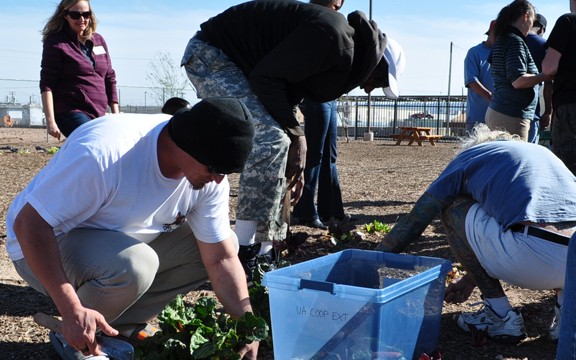A new UA course is aiming to teach homeless people in the Phoenix area about gardening and nutrition provided by the UA Cooperative Extension.
Part of the UA College of Agriculture and Life Sciences, the UA Cooperative Extension recently designed classes known as the Master Gardener Program. The UA Cooperative Extension exists in every county as part of the UA that takes research done on the campus and “translate it to make science useful and improve people’s lives,” according to Haley Paul, an assistant in extension in urban agriculture.
“We are always looking for undergrad and graduate students to volunteer and get involved,” Paul said. “We offer summer internships to students who are interested in making a positive impact in their community.”
The gardening classes were put in place in November by the Maricopa County Board of Supervisors because of the high demand for gardening classes and increased interest in nutritional health, according to Paul. Classes take place at a one acre urban farm just outside the Maricopa County Human Services Campus and are held twice a month on Fridays on a “to be announced” schedule, depending on what maintenance the garden needs at that time.
“This is a tremendous amount of land,” said Manuel Marti, master gardener. “I was skeptical at first going into this program, but there is great potential for gardening and agriculture here.”
The class content is dependent upon what maintenance the garden needs at that time. The last session of the class focused on irrigation and tree staking. Any and all landscaping will be taught but maintenance is highly dependent upon season, Paul added.
“We want everything to be really hands-on so that clients are able to immerse themselves in learning job skills,” Paul said.
The gardening classes are just one of the many programs UA Cooperative Extension offers to the community that implement informal education. UA Cooperative Extension has teamed up with Maricopa County Human Services to execute the gardening classes.
“The demand for farm workers has rapidly increased in America,” Paul said. “There is a good chance that once citizens leave, they can receive farm working positions that pay 12 to 17 dollars an hour.”
UA Cooperative Extension works closely with Desert Mission Food Bank to provide cooking demonstrations for homeless people once harvesting is complete. Chef Ed Debiec, master gardener volunteer and a Desert Mission representative, is one of the volunteers leading these cooking demonstrations. Food demonstrations are designed to teach clients simple and healthy recipes. Not only do clients receive gardening education but they also learn how to cook the food they harvested, according to Debiec.
“This program has impacted my life tremendously,” Debiec said. “My passion is right here at the food bank, helping people learn how to cook healthy, simple food.”









